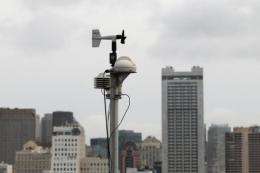Nuclear fears spark rush for radiation detectors

A scare over irradiated food from Japan has sparked a global rush to buy radiation detectors, US dealers said, with most reporting they have no more stock to sell.
Buyers, especially from Pacific rim countries, are snapping up geiger counters amid worries that radiation from the hobbled Fukushima nuclear power plant is spreading around the world.
"Sales are through the roof. We had to suspend orders on our site more than a week ago," said Tim Flanagan, owner of GeigerCounter.com -- which sports a banner, "We are SOLD OUT."
"With this crisis, it's just gone through the roof. We're getting calls from all over the world about these meters," said Mike McBride of Industrial Test Systems, which makes two models of radiation testers.
It's the same story elsewhere. GS Geiger, which sells a $450 German-made hand-held detector, puts the wait time at four months after a gush of orders.
And at Tennessee-based manufacturer SE International, an official said they were too busy working overtime to meet the backlog to talk about it. "We aren't taking any new orders right now," he said.
Most of the geiger counters ITS and GeigerCounter.com sold in the past three weeks have gone to Japan and the US West Coast, with the biggest demand from people worried about irradiated food.
"Japan exports food to the Pacific Rim and Southeast Asia, and they are concerned about contamination," said Flanagan.
Heavy sales on the US and Canadian Pacific coast are also driven by worries of clouds of radiation descending from Japan.
They come from hobbyists, manufacturers who import parts from Japan and some people who just distrust the government to tell them the truth, according to McBride.
Last week one woman walked into his company's Rock Hill, South Carolina office to buy one to check food she buys in the markets that comes from Asia.
"I would consider them scared, or they don't trust the government," he said.
Flanagan said that in a normal year he sells about 1,000 detectors, mostly to rockhounds, gemologists, and scientists.
In the first five days after the March 11 earthquake and tsunami hobbled the Fukushima plant -- prompting fears of a meltdown in one or more of its reactors -- Flanagan emptied his shelves of 500.
Smartphone-sized hand-held models run between $250 and $800, and are easy to use and reliable, dealers say.
"They answer the basic question that most people want to know: is this thing radioactive?" said Flanagan.
"As soon as you turn them on, they'll actually start clicking or beeping, and that will show background radiation."
But a user needs to know that there is always some harmless background radiation, he stressed. He gets a lot of questions about just what level of radiation is dangerous.
"A lot of people don't understand is that ... we humans are being bombarded by radiation constantly, mainly of cosmic origin."
International Mecom, another manufacturer with an inventory depleted by heavy buying, meanwhile called on customers to help monitor radiation levels around the country.
"We encourage all customers to participate in citizen's radiation monitoring networks to make the data they collect available to as many members of our global community as possible," it said in a statement.
"We have monitoring stations set up in Sebastopol California, Ashland Oregon, and Maui Hawaii. All three stations are reporting normal radiation levels at this time."
(c) 2011 AFP














